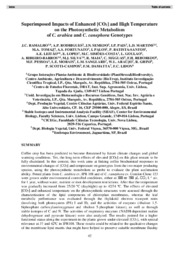Superimposed impacts of enhanced [CO2] and high temperature on the photosynthetic metabolism of C. arabica and C. canephora genotypes.
Superimposed impacts of enhanced [CO2] and high temperature on the photosynthetic metabolism of C. arabica and C. canephora genotypes.
Author(s): RAMALHO, J. C.; RODRIGUES, A. P.; SEMEDO, J. N.; PAIS, I. P.; MARTINS, L. D.; TOMAZ, M. A.; FORTUNATO, A. S.; PALOS, I.; BATISTA-SANTOS, P.; LEITÃO, A. E.; LOPES. E.; SIMÕES-COSTA, M. C.; GOULÃO, L.; RIBEIRO-BARROS, A. I.; SILVA, M. J.; MAIA, R.; MÁGUAS, C.; REBOREDO, F. H.; PESSOA, M. F.; SANGLARD, L M.; ARAÚJO, W. L.; GHINI, R.; SCOTTI-CAMPOS, P.; DaMATTA, F. M.; LIDON, F. C.
Summary: Summary: Coffee crop has been predicted to become threatened by future climate changes and global warming conditions. Yet, the long-term effects of elevated [CO2] on this plant remain to be fully elucidated. In this context, this work aims at linking coffee biochemical responses to environmental changes of [CO2] and temperature on genotypes from the two major producing species, using the photosynthetic metabolism as probe to evaluate the plant acclimation ability. Potted plants from C. arabica cv. IPR 108 and of C. canephora cv. Conilon Clone 153 were grown under environmental controlled conditions, either at 380 or 700 ?L CO2 L-1 air, for 1 year, without water, nutrient or root development restrictions. After that the temperature was gradually increased from 25/20 ºC (day/night) up to 42/34 ºC. The effects of elevated [CO2] and enhanced temperature on the photosynthetic structures were assessed through the characterization of the lipid components of chloroplast membranes, whereas the leaf metabolic performance was evaluated through the thylakoid electron transport rates (involving both photosystem (PS) I and II), and the activities of enzymes (ribulose 1,5-biphosphate carboxylase/oxygenase and ribulose 5-phosphate kinase), as well as through stable isotopes of C and N. The activities of respiratory enzymes (NADH-dependent malate dehydrogenase and pyruvate kinase) were also analyzed. The results pointed for a higher functional status along the experiment in the plants grown under elevated [CO2], with special relevance at 37 and 42ºC in IPR108. These results could be related to the qualitative changes of the membrane lipid matrix that might have helped to preserve suitable membrane fluidity for the membrane bound events (e.g., thylakoid electron transport). The PSs and enzyme data reflect an enhancement of the energetic metabolism (both photosynthesis and respiration), mostly, until 31 ºC for IPR108 and 37 ºC for CL153 at normal [CO2]. Yet, under enhanced [CO2] it was found an increase in the temperature (to 37 ºC) at which maximal values of some parameters in IPR108 (MDH, PSs activities, RuBisCO) were observed, concomitantly with the maintenance of high performance in other parameters when compared to the 380 plants. Under the highest temperature (42 ºC) the enzymes were the most sensitive point, displaying the strongest reductions, irrespective of genotype and [CO2] treatments. The temperature promoted changes in leaf ?13C, irrespective of genotype and [CO2], reflecting a decrease in WUE with heat. The changes in ?15N values may indicate different limitation steps of N assimilation, requiring further investigation. It was concluded that the coffee plants grown under elevated [CO2] apparently showed a better endurance to high temperatures, what is quite relevant in a context of predicted climate changes and global warming scenarios.
Publication year: 2014
Types of publication: Paper in annals and proceedings
Unit: Embrapa Environment
Observation
Some of Embrapa's publications are published as ePub files. To read them, use or download one of the following free software options to your computer or mobile device. Android: Google Play Books; IOS: iBooks; Windows and Linux: Calibre.
Access other publications
Access the Agricultural Research Database (BDPA) to consult Embrapa's full library collection and records.
Visit Embrapa Bookstore to purchase books and other publications sold by Embrapa.

